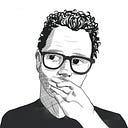Member-only story
How To Become A Better Filmmaker Every Day
Filmmaking is hard and expensive. How can you build a daily practice?

An edited version of this essay first appeared in The Third Something, a free newsletter about visual storytelling. Subscribe!
Daily practice is a powerful phenomenon in any discipline. The laws of compound interest come into effect and with even minimal commitment — just one hour a day, let’s say — mountains become rubble.
I received an email from Brendan, a British filmmaker, who asked a really interesting question. I will try and answer here (with Brendan’s permission):
…I was wondering if there was anything you’d found which was like the equivalent of doing scales on the piano, deliberate practice that improves your work. Video essays involve so many disciplines: finding ideas, research, writing, visual thinking/directing, editing, music research/composition, motion graphics, sound design… I wondered what you saw as the most important skills and whether you’d found particular activities that improved them?
Brendan is right to be thinking about daily practice as a filmmaker.
Daily practice takes the pressure off the individual action. When do you something every day, you can have bad days without it being a disaster. Daily practice builds momentum and muscle memory.
But filmmaking is a funny one. The time, money and people required to make a movie mean very few of us can be directing a film a day.
We have to come up with ways of practicing by proxy.
Practice-by-proxy
A few years back I put this very same question to filmmakers on Twitter: “what is your equivalent to practicing scales?” I asked.
I was, to be honest, disappointed by the answers, which fell into two camps: a lot of people said their form of practice was watching films, which is like Tiger Woods saying his daily golf practice involves watching reruns of the Masters on ESPN.
The other half of people said their practice was writing.
I can see value in that — writing is unbeatable as the fastest and cheapest way to elucidate and communicate ideas. It’s a good way to practice drama.
